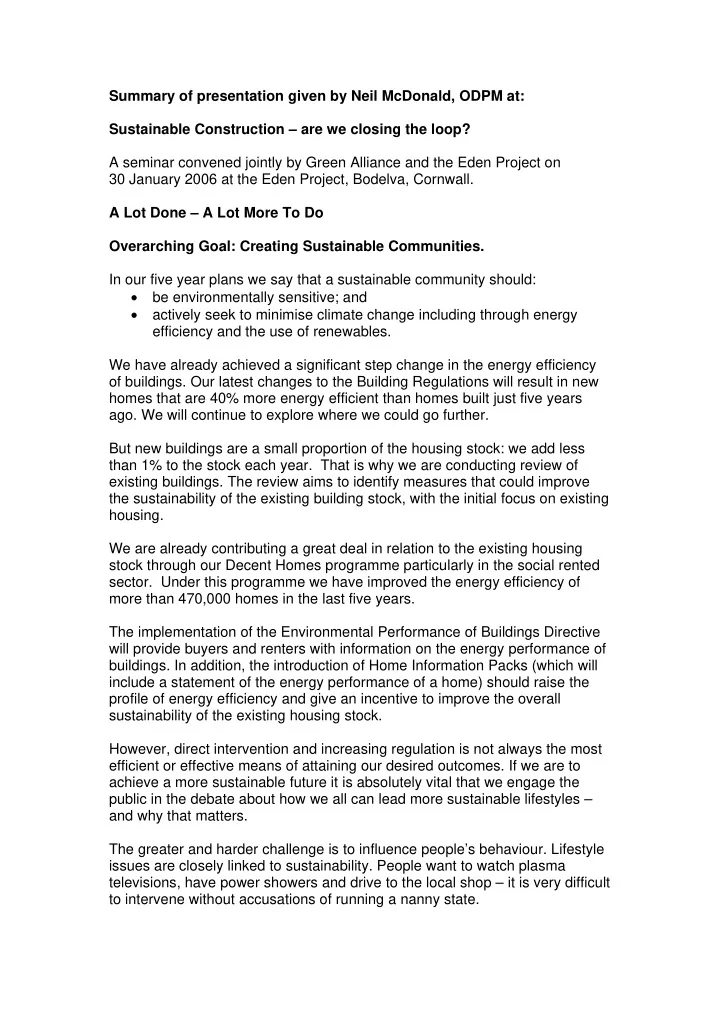

Summary of presentation given by Neil McDonald, ODPM at: Sustainable Construction – are we closing the loop? A seminar convened jointly by Green Alliance and the Eden Project on 30 January 2006 at the Eden Project, Bodelva, Cornwall. A Lot Done – A Lot More To Do Overarching Goal: Creating Sustainable Communities. In our five year plans we say that a sustainable community should: • be environmentally sensitive; and • actively seek to minimise climate change including through energy efficiency and the use of renewables. We have already achieved a significant step change in the energy efficiency of buildings. Our latest changes to the Building Regulations will result in new homes that are 40% more energy efficient than homes built just five years ago. We will continue to explore where we could go further. But new buildings are a small proportion of the housing stock: we add less than 1% to the stock each year. That is why we are conducting review of existing buildings. The review aims to identify measures that could improve the sustainability of the existing building stock, with the initial focus on existing housing. We are already contributing a great deal in relation to the existing housing stock through our Decent Homes programme particularly in the social rented sector. Under this programme we have improved the energy efficiency of more than 470,000 homes in the last five years. The implementation of the Environmental Performance of Buildings Directive will provide buyers and renters with information on the energy performance of buildings. In addition, the introduction of Home Information Packs (which will include a statement of the energy performance of a home) should raise the profile of energy efficiency and give an incentive to improve the overall sustainability of the existing housing stock. However, direct intervention and increasing regulation is not always the most efficient or effective means of attaining our desired outcomes. If we are to achieve a more sustainable future it is absolutely vital that we engage the public in the debate about how we all can lead more sustainable lifestyles – and why that matters. The greater and harder challenge is to influence people’s behaviour. Lifestyle issues are closely linked to sustainability. People want to watch plasma televisions, have power showers and drive to the local shop – it is very difficult to intervene without accusations of running a nanny state.
We need to get people on our side, not just appear to be stopping them doing things they enjoy or find convenient. Access to information is vital if people are to take informed and responsible action. That is why we are currently consulting on the Code for Sustainable Homes. Code for Sustainable Homes The Code for Sustainable Homes’ (the Code) principal objective is to improve information about the environmental performance of homes as a non- regulatory means of improving the sustainability of buildings. Its aim is to become the single national standard that all developers will subscribe to - and consumers demand. The Code’s initial focus is on the environmental impact of the building process. Over time the Code may be extended to consider all aspects of sustainability – environmental, social and economic issues in a balanced and equitable way. The Code is based on performance standards concentrating on outcomes rather than prescriptive methods of compliance. The Code is consistent with the Government’s commitment simplify the regulatory landscape through deregulation, consolidation and rationalisation. The Code is not about re-inventing the wheel nor is it revolutionary. We have agreed to work (in partnership) with the BRE Trust to establish a single national Code which builds on BRE’s BREEAM for Homes (EcoHomes) and incorporates essential requirements in key resource efficiency areas. Our agencies - English Partnerships and the Housing Corporation - are the largest user of EcoHomes. This agreement ensures an orderly transition from EcoHomes into the new Code. This is an evolving process. In summary it is proposed that all homes built to the Code will meet minimum essential requirements in key resource efficiency areas – energy, water, waste and materials. The consultation invites views on these minimum values and on the proposed higher levels of the Code. The Code signals a new direction for building standards. It is the first step in encouraging more sustainable homes. We are consulting widely to ensure we take this opportunity to deliver a simple and effective sustainability framework for both the building industry and the public. The Code offers a fresh approach to delivering higher levels of sustainability by providing home buyers with clear information and offering advice on reduced running cost as well as encouraging developers to offer more innovative solutions. Home buyers will be provided with information on the sustainability of the materials used be build a new Code home. In addition, there is the home user’s guide; this will provide information and advice on how to ensure that the home is run in the most cost-effective and sustainable way. So the Code will empower home owners to choose to adopt a more sustainable life style.
Recommend
More recommend